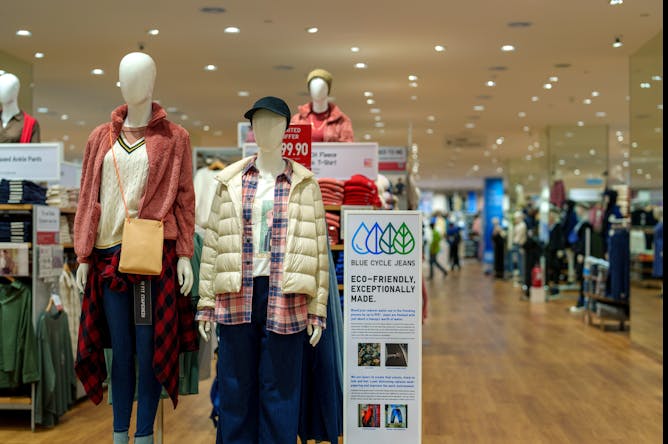|
Canada’s sugar industry is a central part of Canadian history. But it’s also a violent history built on a foundation of enslaved and indentured labour.
Today in The Conversation Canada, Donica Belisle from the University of Regina shines a light on this industry by tracing the history of Canadian sugar from past to present.
Belisle explains how Europeans, in what is now Canada, played a role in the transatlantic sugar and slave trades. She also writes about how Canadian sugar companies sourced cane sugar from plantations that employed indentured workers and were rife with horrendous living and working conditions.
Belisle explains that by reflecting on the origins of the sugar industry, we can “work toward greater recognition for those who have laboured in the local and global Canadian sugar industry.”
Also today:
Regards,
|

|
Eleni Vlahiotis
Assistant Editor, Business + Economy
|
|

By reflecting on sugar’s origins, we can trace the pathways that have made this commodity so abundant.
THE CANADIAN PRESS/Jonathan Hayward
Donica Belisle, University of Regina
By reflecting on the violent origins of the Canadian sugar industry, we can bring wider attention to the exploitation underpinning the history of Canadian cuisine.
|

The U.S. Federal Deposit Insurance Corporation seized the assets of Silicon Valley Bank on March 10, 2023, marking the largest bank failure since Washington Mutual during the height of the 2008 financial crisis.
(AP Photo/Jeff Chiu)
Michael R. King, University of Victoria
Large Canadian banks are likely not at risk of bank failures, but history suggests smaller, more niche financial service firms could be.
|

An Iranian woman protests the death of Mahsa Amini, who died after being detained by the morality police in Tehran in September 2022. This photo was taken by an individual not employed by the Associated Press and obtained by the AP outside Iran.
(AP Photo/Middle East Images)
Mona Tajali, Agnes Scott College; Homa Hoodfar, Concordia University
Following a brutal government crackdown, Iranian protesters are organizing strikes, sit-ins, boycotts and publicizing their demands in the form of manifestos, charters and bills of rights.
|

Even if we achieve our global commitment to limit temperature increase to less than 2 C this century, climate change will continue to impact the culturally significant Rideau Canal Skateway.
(Shutterstock)
Shawn Kenny, Carleton University
Erratic weather patterns occurring due to climate change may become a more significant factor affecting the season start and ice-building processes in the future.
|

Screenshot taken from ‘There Will Be No More Night’ by Éléonore Weber.
Santasil Mallik, Western University
As we approach the 20th anniversary of the invasion of Iraq, it is important to reflect on the use of war footage in media and the ethical questions around the use of footage depicting human death.
|

An abandoned house in the old town of Mosul, Iraq.
(Ali Al-Baroodi, @ali_albaroodi)
Mend Mariwany; Nehal El-Hadi, The Conversation
The U.S.-led invasion of Iraq in 2003 led to civilian death and displacement. Twenty years later, Iraqis are telling their stories of conflict and trauma as they move towards healing.
|

NOSM University, which began as the Northern Ontario School of Medicine, may potentially offer a model for Northern education in other professional fields.
(NOSM University)
Avery Beall, Nipissing University; David Zarifa, Nipissing University
Ontario’s changed university funding formula, which forces institutions to rely on high student tuition for niche programs, is putting some northern institutions in precarious financial situations.
|
La Conversation Canada
|

Une boutique s'affichant éco-responsable. Plusieurs marques incitent leurs clients à consommer mieux - et moins. Leur démarche est-elle crédible avec leur objectif ultime, soit de vendre leurs produits?
(Shutterstock)
Kolli Inès, Université du Québec à Montréal (UQAM); Amélie Guèvremont, Université du Québec à Montréal (UQAM); Fabien Durif, Université du Québec à Montréal (UQAM)
Plusieurs marques prônent la consommation responsable auprès de leurs clients. Cette stratégie de sobriété, perçue positivement par les consommateurs, devient un outil de différentiation.
|
Arts
|
-
Edwina Preston, The University of Melbourne
Edwina Preston pays tribute to the humble letter: from literary love letters to philosophical lessons to cherished family heirlooms. Letters impart lessons, reveal character – and are a form of art.
|
|
Environment + Energy
|
-
Scott L. Montgomery, University of Washington
Biden vowed ‘no more drilling on federal lands,’ but Russia’s war on Ukraine and pressures at home are hard to ignore.
|
|
Health
|
-
Muhammad Waqas, University of Bradford; Syka Iqbal, University of Bradford
There are a range of reasons people with long COVID may have poorer mental health.
|
|
|
|
| |
| |
| |

|
| |
| |
| |
| |
| |
| |
|
|